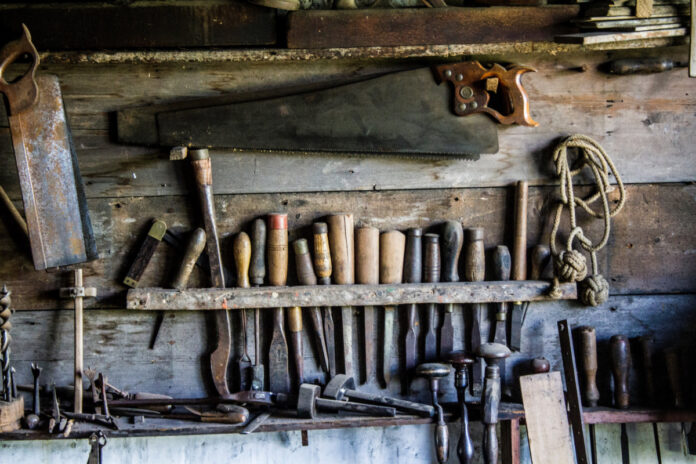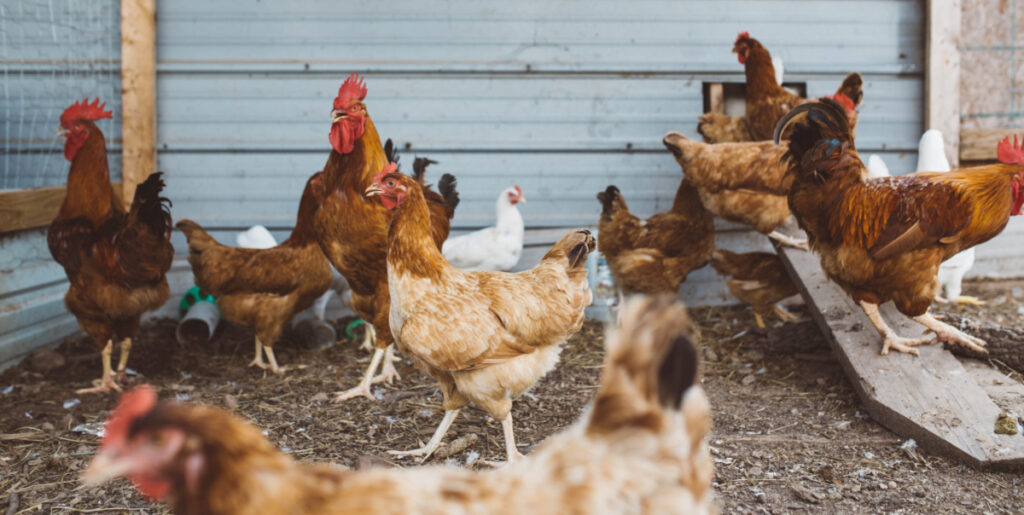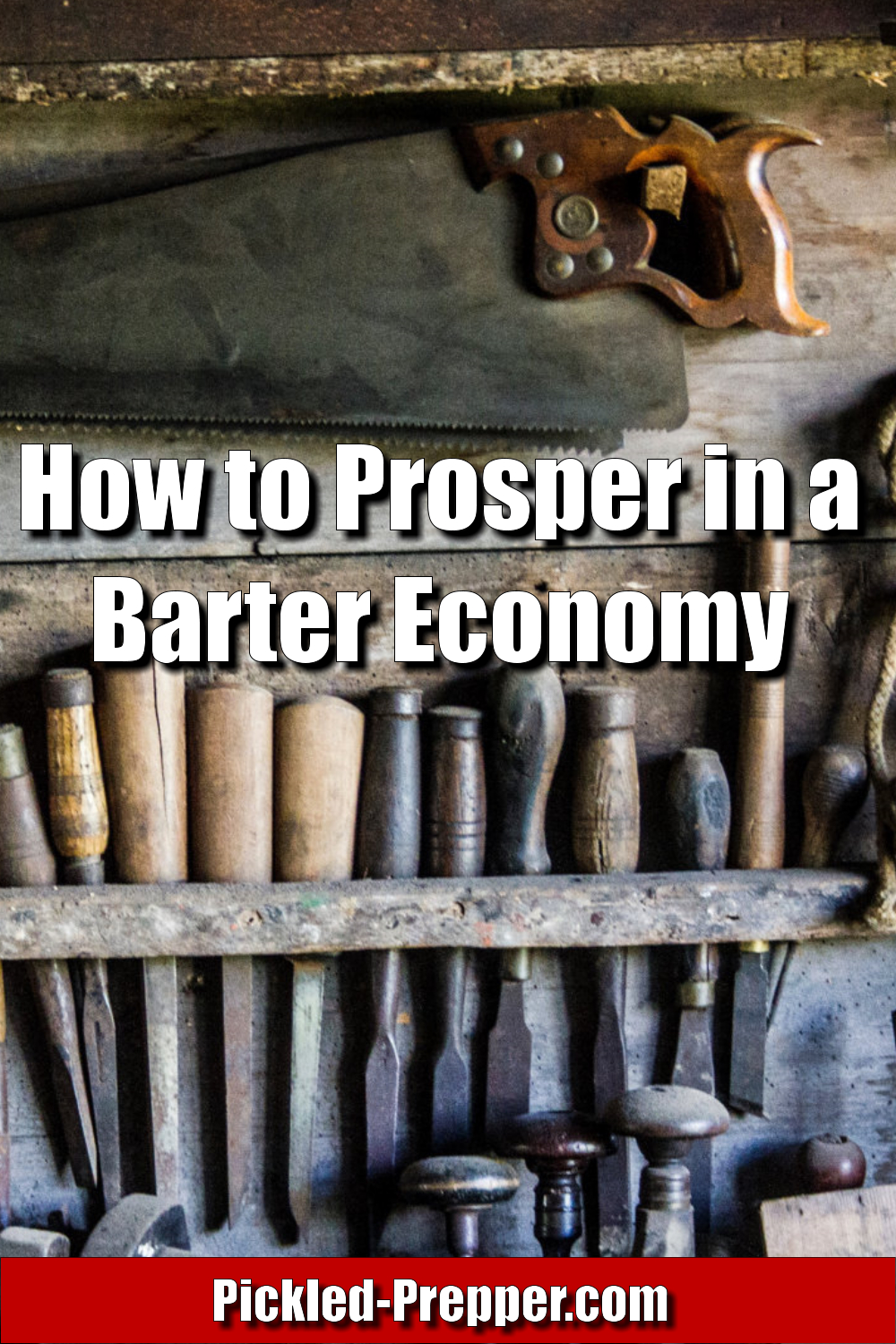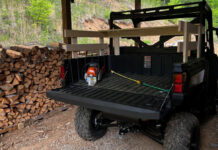
The Traditional Problems with Barter
Let’s say that you looked at a number of lists of potential barter goods online (all of which include coffee, cigarettes, alcohol and various drugs and medicines), and you decided to stock alcohol because it does not go bad, get stale, or have an expiration date. Over time, you accumulate whiskey, bourbon, and vodka in sizes ranging from tiny single-serving airline bottles to fifths, liters and even some half gallons.
Then we go through some kind of economic or societal collapse and you survive. WooHoo! Time to start trading your alcohol for the stuff you need to survive.
That’s where the problems arise:
- How are you going to find people to trade with? Do you put out a sign? Do you hang out somewhere and say “Psst, what will you give me for this bottle of whiskey?”
- How many of your neighbors desperately need alcohol? (Or coffee, or cigarettes?) Everyone needs food, but not everyone needs alcohol.
- When you finally find a hardcore alcoholic who needs alcohol to survive, are they going to have anything to trade? Do you happen live in an area of wealthy alcoholics?
- What could possibly go wrong with letting a bunch of addiction-driven, angry, frightened people know that you have alcohol at your home?
I’ll let your imagination percolate on that for a while.
The other big problem about stocking goods for barter is that eventually, you are going to run out. Any time you barter physical goods that you have stored up, the value of your inventory goes down. When you have nothing left to barter, then what will you do?
That brings us to our first tip.
Barter Tip One: Barter Renewable Resources
A successful barter should be trading something you have and can get more of for something the other guy has and can get more of. In other words, let’s say you have several rows of asparagus and an abundant harvest results in far more than you can eat. Your ideal trade would be to offer bundles of asparagus to someone who does not grow it in return for something they grow but you do not.
For example, Bob does not grow asparagus, but he has cherry trees and you don’t. So you trade your asparagus in return for his cherries. Maybe the cherries ripen a few weeks after the peak of the asparagus season. You decide to take the risk and trust Bob because you know where he lives. And besides, you can only eat so much asparagus. When the time comes, Bob drops off the bucket of cherries and you guys have cherry cobbler for dessert. It’s a nice change from asparagus. You decide to can some of them up so you can have cherries all year long.

Now let’s picture a guy named Stan who wants asparagus. Stan doesn’t have a garden or livestock. He offers you a bunch of electronic crap that no one can use any longer because the power is out. You tell him you only want food or tools. He finally offers you a can of black olives. You don’t really need black olives, but you accept the trade because you have a lot of asparagus and barring a serious misfortune, you’ll have more next year, but it’s going to be years before new cans of black olives show up again in your neck of the woods.
Barter Tip Two: Use Barter to Build Relationships
In the examples above, you will probably not trade with Stan again because he has nothing to offer you. But Bob will have cherries again next year, so the trade with him is repeatable and repeatable trades that benefit both parties are the kind of win-win you want to look for.
The next time you see Bob, you complement him on the cherries, thank him, and tell him you’re looking forward to trading again next year. Bob may be a guy who was on the opposite political spectrum from you, hated your favorite football team, and drives a Ford while you have a Chevy, but suddenly, you have the foundation for a commercial relationship that could blossom beyond that.
Bob tells you he has a big harvest of Brussels sprouts due in and asks if you have anything you want to trade for Brussels sprouts? You have an awful lot of acorn squash on the vine, so you offer that. He accepts. Now you and Bob are trading partners and have a vested interest in each other’s survival.
In the fall, your potato harvest is so big that you drop a bag of potatoes off at Bob’s house, no questions asked. He next time his wife makes apple butter, he stops by and gives you a couple jars. Your relationship has progressed towards friendship and you start to look out for each other.
Barter Tip Three: Barter Skills, Services, and Man Power
While fruit, vegetables, and eggs are examples of renewable resources that make good barter items, so do skills and services. Maybe you or your spouse used to work at a hair salon. The ability to cut hair is a renewable resource. You can trade haircuts and never run out. Medical and nursing skills, midwife skills, veterinary skills, small engine repair, gunsmithing, carpentry, sewing, welding and other skills will all be potentially valuable in a post-TEOTWAWKI situation.
Even people without skills can offer manpower. Maybe the farmer down the road needs help planting and harvesting. Maybe the older couple needs firewood cut and split. Even ditch digging and clearing rocks from a field are tasks teenagers and other low-skilled people can do.
Barter Tip Four: Barter for More
When you cut someone’s hair, that haircut took half an hour. If possible, you want to trade it for something that is worth more than half an hour of your time. After all, the haircut will last six weeks or more. If a half hour working for yourself is worth more than they give you in return for the haircut, then it was a bad trade, unless you are building a relationship.
If you spent all day digging a ditch, you want to trade it for something that is worth more than you would accomplish working at home that day. For example, don’t dig a ditch in return for a day’s worth of food. The next day, that ditch will still be there, but you’ll be hungry again. If you are starving, you take that deal, but you should always try to negotiate for more.
For example, you want to barter for food that will feed your family for several days because digging a ditch is hard work, and at best, you’ll end up tired. At worst, you could injure yourself and be unable to work for several days. Trading a day’s work for a day’s room and board is not much more than being an indentured servant. You want to try to get ahead because there will be days you cannot work due to the weather or injury, and you need to be able to set something aside for those days.
Barter Tip Five: Don’t Barter Ammo to Strangers
If Bob comes to you and asks if you can spare any .30-06 ammo for his hunting rifle, you would happily trade with him because you now have a relationship. Hopefully you have a case, but even if you have only one box, you can spare him three rounds because you know if he makes a big kill, he’ll bring you some meat.

But if some random guy you bump into the next time you’re in town asks if you have any ammo to trade, tell him you don’t have any to spare, even if he offers you silver or gold. Why? Because ammo can come back at you in the worst way.
You only want to put ammo into the hands of people you trust and with whom you have shared interests.
For example, if the Smith family down the road a few properties says they need buckshot for their home-defense shotgun and you have hundreds of rounds, give it to them unless you know that Smith or his teenage son is a low-life loser. The odds are that if rovers or raiders come, they’ll reach their house before yours. It’s in your self-interest to make sure the Smiths can defend themselves. One, the noise will alert you, and two, they may resolve the problem before it ever reaches your property. Even if you only have an ammo can with 175 shells of 00-buck, it’s probably worth it to give Smith 25 rounds and promise to back them up if they come under attack.
Assuming that Smith is an honorable man, that gesture alone is probably worth more to your long term survival than the 25 rounds of buckshot.
Barter Tip Six: Try to Trade Like for Like
When you are trading goods, like food, it’s pretty easy to make a judgment on what is a reasonable trade. My home-canned green beans for your home canned corn seems fair. The six cloth diapers we sewed for the bee hive you built might be workable.
But when you are trading your labor for one of your neighbor’s piglets, then it’s a different story. That’s a much harder trade to negotiate and reach a place where both parties are satisfied. Trading a piglet for a goat kid is a more straight-forward exchange.
With services, it can be easier. Trading my plumbing expertise to rig up an outdoor shower in return for your tuning and sharpening both my chainsaws might be mutually satisfactory.
Don’t trade something that will produce forever for something that won’t. I would trade chickens that lay eggs for a pair of breeding rabbits, but I would trade eggs — not live chickens — for canned food.

I’m going to lump don’t trade for money, gold, or silver into this category. Unless there is a thriving marketplace or other system in place where gold and silver can be used for a medium of exchange, then avoid trading away valuable goods and your time for shiny metals that may not have any real value until after the recovery.
Barter Tip Seven: Try Not to Trade Away Pre-Crash Goods
There’s a whole list of irreplaceable items you never want to trade away, starting with gasoline, motor oil, commercially canned foods, water filters you might need, clothing and footwear that fits or will one day fit people in your family, etc. Things that come from oversea or take advanced technology to produce are valuable and should be conserved, especially if they improve your life or standard of living. I’d trade gasoline and my last can of Spam for medicine to save a family member’s life, but not because we’re out of chocolate chips and someone has a craving.
Simply put: If you trade away an irreplaceable item for a renewable item you got the short end of the stick.
Let’s say you have a couple solar panels and you use them to charge your batteries, your devices, and run a few lights at night. You can offer to charge someone else’s device, but you never want to trade away your solar system. (This should be obvious, but sometimes people make dumb trades because they are desperate.)
When trading pre-crash goods, you only want to trade surplus items. For example, if you have a gasoline engine on your lawnmower, but no gasoline, it is ok to trade the engine or the entire mower to someone who needs the engine. If you have six shovels, you could probably let one go. But don’t trade guns unless you get something very valuable, like a pregnant goat, in return.
Barter Tip Eight: Don’t Make Barter Enemies
Maybe you are the best prepared in your entire neighborhood with the deepest stockpile. That’s something you can be secretly pleased about, but you should not lord it over people or cause resentment. Barter fairly; don’t ask for their first born. Help people out today so that they will return the favor in the future. Use barter or even well-placed gifts to encourage people to think favorably of you.
I’d rather 10 people owe me favors and not be able to pay me back than to have 1 local person be angry and resentful because they think I screwed them over. You never know how anger and resentment will grow and what kind of retribution they might seek. Work towards a compromise and do what you can to help without negatively impacting your family’s survival.
It’s much better to say, “Wow, I wish I could help you but my wife would kill me if I gave away her shampoo. Did you know you can make soap with animal fat and lye you can get from wood ashes?” than it is to say, “Yeah, we got plenty of shampoo, but you don’t have anything I want.”
Maybe I should have called tip eight “Don’t be a ass.”
Barter Tip Nine: Be Low Key
The great thing about bartering renewable resources is that it is difficult for someone to steal them from you. If you become known as the guy who is always willing to trade his asparagus, broccoli and squash, people know you grow them every year. If they are the type that want to steal, they are not gong to be the type that wants to take over your property and work in the garden. They are looking for a quick score, and broccoli is probably pretty far down their list.
Likewise, they can’t steal your hair-cutting or midwifery skills unless they kidnap you. On the other hand, if you become known as the guy with a stash of alcohol, ammo, gold and silver, or other pre-SHTF goods, you could become a target. So even if you have a basement store room loaded with supplies, keep your mouth shut, and teach your family to do the same.
Never brag, gloat, or promote your great pile of survival goods. Always downplay things and be low key. When you trade away goods, act like you are delighted to finally get rid of that broken down lawnmower or act like it pains you to give up your “next to last” can of spam. In other words, don’t leave the person with the impression there’s more where that came from unless you grow it or just shot it and can’t store the meat.
Barter Tip Ten: Don’t Make Immoral Trades
My final advice would be don’t barter for sex, murder, illegal drugs, or anything else that would be a serious crime prior to the SHTF. The only time you should barter sex is when you trade livestock stud services, so avoid anyone that looks like a pimp or trafficker.
Associating with criminals and others with little or no morals will come back to bite you. It will reduce your stature in the eye’s of other righteous men and it will make you a target of your new trading partners who would rather take than trade.
Yes, there are going to be plenty of low-lives who come out of the woodwork in a WROL scenario, but the only time you should sink to their level is when you have to resort to violence to protect yourself. Unless you are what passes for the law in your community, mind your own business and hope they mind theirs.
Bartering for the Prepper
In summary, always look for a win-win in bartering, because a successful trade is one that both partners are satisfied with and would do again. Look at barter as a way to build relationships, not create strife and resentment.
While you can stock all kinds of goods for TEOTWAWKI, stocking cigarettes when you don’t smoke or liquor when you hardly drink is probably not the best allocation or your finite resources. Stock things you and your family need, and build skills that you can use when the power is out, the gasoline is running low and dollar is worthless.
if you enjoyed this article, you might like How to Prep for a Recession or some of our other prepping articles.







